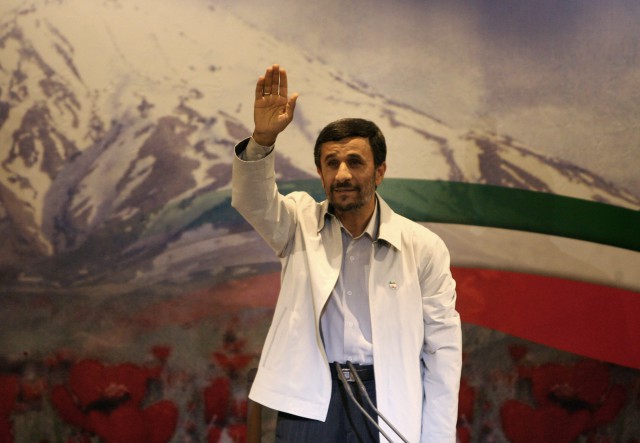
five years to assess adherence to the pact and consider ways to bolster
the global non-proliferation system, usually commands little attention
beyond policymakers and arms control wonks.
But Ahmadinejad’s quest to speak at Monday’s opening of the nearly monthlong meeting at
“I’m sure Ahmadinejad is going to
application will be approved. They said there were no plans for side
meetings between U.S. and Iranian officials.
The conference comes as U.S., Chinese, Russian, British, French and German diplomats meet almost daily at
International concerns have grown following
unveiling in April of a more efficient enrichment device, its rejection
of a U.N.-backed compromise plan for using its stock of low-enriched
uranium and a revelation last September that it secretly built a second
enrichment facility under a mountain near the holy city of Qom.
Because Ahmadinejad outranks Clinton as a government
head, protocol may dictate that he speak first. This would give him the
platform to state that the Iranian program is for peaceful purposes and
accuse
“The Zionist regime which has over 200 nuclear warheads and has waged several wars in the region is fully supported by
Other nations are expected to raise contentious issues during the conference, among them charges that
A
Those disputes are raising fears that the 189 treaty
members will fail — as they did in 2005 — to reach the consensus needed
for a final declaration and a work plan to strengthen the NPT.
“It is not, I think, a foregone conclusion that the 2010 conference is going to be a success,” retired Sri Lankan Ambassador
Obama aides in recent days have downplayed the importance of reaching a final declaration.
“We are going to
“The review conference is not a silver bullet or an end in and of
itself. It is one of several tools at our disposal to halt the
proliferation of nuclear weapons.”
“In our view, whether there is a consensus final
document should not be the measuring stick to judge the success of the
review conference,” she said.
Instead, U.S. officials portray the conference as a platform from which
military reliance on nuclear weapons and a new arms reduction treaty
with
“What we can do is inject some kind of positive energy into the whole non-proliferation regime,” Assistant Secretary of State
Such an approach, U.S. officials said, would give
“leverage” to promote new watchdog powers for the U.N. International
Atomic Energy, which is charged with enforcing the NPT, and stiffer
penalties against countries like
“For those who wish to block consensus or evade
accountability for their NPT violations, we can demonstrate that they
stand in stark isolation from the rest of the international community,”
Tauscher said. “That will be a positive outcome itself.”
The 1968 treaty is considered the bedrock of the global system designed to halt the spread of nuclear weapons.
It requires the nuclear weapons states at the time the treaty was signed —
— to reduce and eventually eliminate their arsenals. And it guaranteed
non-nuclear weapons states access to peace nuclear technology so long
as they refrained from developing nuclear weapons.
Since then, however, the system has been badly battered.
hid for 18 years a uranium enrichment program built on know-how sold by
a Pakistani-led smuggling ring and has refused to answer IAEA questions
about arms-related activities.
———
(c) 2010, McClatchy-Tribune Information Services.
Visit the













